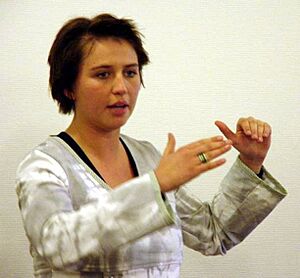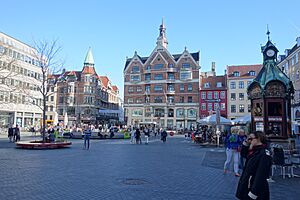Mette Frederiksen facts for kids
Quick facts for kids
Mette Frederiksen
|
|
|---|---|
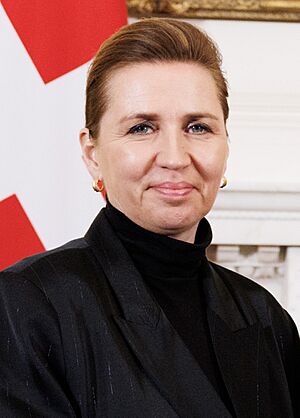
Frederiksen in 2025
|
|
| Prime Minister of Denmark | |
| Assumed office 27 June 2019 |
|
| Monarch | Margrethe II Frederik X |
| Deputy | Jakob Ellemann-Jensen Troels Lund Poulsen |
| Preceded by | Lars Løkke Rasmussen |
| Leader of the Social Democrats | |
| Assumed office 28 June 2015 |
|
| Deputy | Frank Jensen Mogens Jensen |
| Preceded by | Helle Thorning-Schmidt |
| Minister of Justice | |
| In office 10 October 2014 – 28 June 2015 |
|
| Prime Minister | Helle Thorning-Schmidt |
| Preceded by | Karen Hækkerup |
| Succeeded by | Søren Pind |
| Minister of Employment | |
| In office 3 October 2011 – 10 October 2014 |
|
| Prime Minister | Helle Thorning-Schmidt |
| Preceded by | Inger Støjberg |
| Succeeded by | Henrik Dam Kristensen |
| Member of the Folketing | |
| Assumed office 20 November 2001 |
|
| Constituency | Copenhagen (2001–2007) Greater Copenhagen (2007–2019) North Jutland (2019–present) |
| Personal details | |
| Born | 19 November 1977 Aalborg, Denmark |
| Political party | Social Democrats |
| Spouses |
Erik Harr
(m. 2003; div. 2014)Bo Tengberg
(m. 2020) |
| Children | 2 |
| Alma mater | Aalborg University (BA) University of Copenhagen (MA) |
Mette Frederiksen (born 19 November 1977) is a Danish politician. She has been the prime minister of Denmark since June 2019. She is also the leader of the Social Democrats party since June 2015.
Mette Frederiksen is the second woman to hold either of these important jobs in Denmark. She is also the youngest prime minister in Danish history. She was the first prime minister born after Margrethe II became queen. She is also the first to serve under Frederik X.
Before becoming prime minister, Frederiksen worked for a short time with a trade union. She was first elected to the Folketing (the Danish Parliament) in 2001. After her party won the 2011 election, she became the Minister of Employment. Later, in 2014, she became the Minister of Justice.
After her party lost the 2015 election, she became the leader of the Social Democrats. She then led her party to victory in the 2019 election. Her party and other left-leaning parties won enough seats to form a government. She became prime minister on 27 June 2019. By December 2021, she was the longest-serving female leader of a government in the European Union.
In 2022, her government faced some criticism for how it handled a situation with mink during the COVID-19 pandemic. She called an early election for November 2022. In this election, her party had its best result in 20 years. She then formed a new government with other parties and continued as prime minister.
In Denmark, Mette Frederiksen has focused on policies like helping manual workers retire earlier. She has also worked to improve vocational education. Her government also managed Denmark's response to the COVID-19 pandemic.
In foreign policy, she has become a strong supporter of the European Union. She has also strongly supported Ukraine after the Russian invasion. Denmark has increased its spending on defense under her leadership.
| Top - 0-9 A B C D E F G H I J K L M N O P Q R S T U V W X Y Z |
Early Life and Education
Mette Frederiksen was born on 19 November 1977. Her hometown is Aalborg in northern Denmark. Her father worked as a typographer, and her mother was a teacher. When she was a teenager, she cared about protecting rain forests and whales. She also worked to end apartheid.
Frederiksen went to Aalborghus Gymnasium for high school. She earned a bachelor's degree in Administration and Social Science from Aalborg University. She later received a master's degree in African Studies from the University of Copenhagen.
Political Journey
Member of Parliament
Before becoming a member of parliament, Frederiksen worked as a youth consultant. She was elected to the Folketing (Danish Parliament) in 2001. This was the first time since 1920 that the Social Democrats did not come in first place. After her election, she became her party's spokesperson for culture, media, and gender equality.
In 2002, she won the Nina Bang award for her political courage. She also received the Ting Prize in 2012. She helped write two books: Epostler (2003) and From Fight to Culture (2004).
After the 2005 election, she became the party's spokesperson for social affairs. She also served as the vice-chairperson for her party's group in parliament. In the 2007 election, she received many votes, showing her popularity.
After the 2011 election, the Social Democrats formed a government. Frederiksen became the Minister for Employment from 2011 to 2014. She then served as the Minister of Justice from 2014 until she became party leader. As Minister of Employment, she worked on changes to pensions and job programs.
Leading the Social Democrats
After the 2015 election, Mette Frederiksen became the leader of the Social Democrats. Under her leadership, the party focused more on helping workers and families. They also took a firm stance on immigration.
Prime Minister of Denmark
Becoming Prime Minister in 2019
In the 2019 Danish general election, the Social Democrats gained more seats. Other parties lost support, and the prime minister at the time, Lars Løkke Rasmussen, lost his majority. Mette Frederiksen became prime minister on 27 June 2019. She led a government made up only of Social Democrats, supported by other left-leaning parties.
Handling the Mink Situation
In November 2020, Mette Frederiksen's government decided that all mink in Denmark should be culled. This was done because of the risk of COVID-19 infection. Later, it was found that the order to cull all mink was not fully legal at the time it was given.
A special group was set up to look into the case. Their report in June 2022 said that Frederiksen's statements were "misleading" but that she did not know the order was illegal. After pressure from other parties, Frederiksen announced an early election for 1 November 2022.
The 2022 Election and New Government
The 2022 Danish general election was a great success for the Social Democrats. It was their best result in over 20 years. Even though her party won a small majority, Frederiksen decided to form a new government with parties from different political sides.
On 13 December 2022, Mette Frederiksen presented her new government. It included the Moderates and Venstre parties. This was the first time the Social Democrats and Venstre had formed a government together since 1978. Frederiksen continued as prime minister.
Foreign Policy and Global Relations
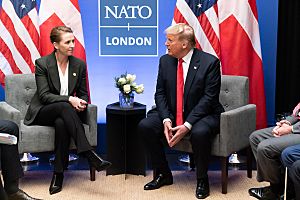
Mette Frederiksen gained international attention in August 2019. This happened when U.S. President Donald Trump canceled a visit to Denmark. He had discussed buying Greenland, which is part of the Kingdom of Denmark. Frederiksen said that Greenland is not for sale and that the idea was "absurd."
In early 2022, Frederiksen started talks about having American troops in Denmark. She said Denmark wanted a stronger American presence in Europe. In December 2023, Denmark and the U.S. signed an agreement. This allows U.S. soldiers and military equipment to be based at certain Danish air bases.
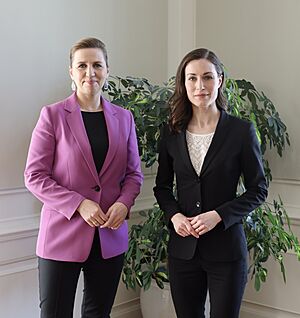
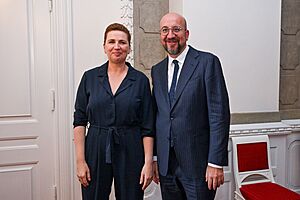
Supporting Ukraine
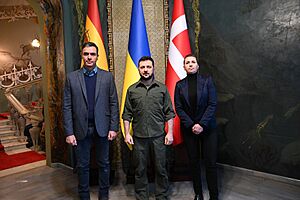
After the 2022 Russian invasion of Ukraine, Frederiksen's government increased Denmark's defense spending. They also planned to become independent from Russian gas. Denmark also held a vote on whether to remove its special rule about not taking part in EU defense.
On 21 April 2022, she visited Kyiv, Ukraine's capital, with the Spanish Prime Minister. She met with Ukrainian President Volodymyr Zelenskyy. Frederiksen promised more weapons and aid to Ukraine. Denmark has been a strong supporter of Ukraine.
European Union Views
In 2020, some people called Frederiksen "the most EU-skeptic Danish Prime Minister in history." However, her views changed a lot due to the COVID-19 pandemic and the war in Ukraine. She became a strong supporter of cooperation within the European Union.
In the 2022 vote on the EU defense opt-out, Frederiksen campaigned to remove it. This means Denmark can now take part in EU defense cooperation.
Nord Stream Pipeline Incident
In 2022, there were gas leaks in the Nord Stream pipeline. Frederiksen said this was an act of sabotage. She stressed the need for more security for important infrastructure. She also said that threats from Russia should be taken seriously.
Military Spending
In May 2023, her government decided to greatly increase Denmark's military spending over the next 10 years. This increase will help Denmark reach the NATO goal of spending 2% of its GDP on defense. In February 2025, she stated that Denmark would increase defense spending to over 3% of GDP within two years.
Response to the COVID-19 Pandemic
Frederiksen led the Danish government's response to the COVID-19 pandemic. In 2020, she ordered the culling of millions of mink due to the virus. In 2021, she worked with leaders from Austria and Israel. They aimed to set up a joint fund for research and production of COVID-19 vaccines. This was to ensure long-term supplies.
Education Changes
In June 2021, Frederiksen's government announced a new way to assign students to high schools (gymnasiums). The goal was to reduce differences between schools based on family income.
A year later, in June 2022, her government planned to set a limit on the highest grades needed for university entry. This was to reduce pressure on students. It also aimed to give students more freedom in choosing their education.
In September 2022, Frederiksen suggested shortening about half of all master's degrees from two years to one year. This mainly affected social sciences and humanities. She said this would improve education quality and allow workers to be trained on the job.
Political Views
Social Policies
Frederiksen has said she wants to be a "Prime Minister of Children." In 2021, she presented a "Law of Children" plan. This plan aimed to prioritize children in social cases. It would give local areas more resources to help children from difficult homes. It also aimed to give children more rights in divorce cases.
In 2020, she also made an agreement to allow people who have worked for a long time to retire earlier. This was a key promise during her 2019 election campaign.
Immigration Views
Frederiksen has become more cautious about large-scale immigration. She believes it has had negative effects for many people. She has called for limits on non-Western immigrants. She also supports the idea of sending asylum seekers to reception centers in North Africa.
Despite these stricter policies, her government has also made some changes. They have rejoined the UN refugee quota system. They have also increased social benefits for refugees.
Climate Change Actions
Frederiksen's government made headlines for agreeing to reduce Denmark's carbon emissions by 70% by 2030. This is compared to 1990 levels. They also decided to stop oil and gas exploration after 2050.
Frederiksen has said she is a "social democrat before I am green." This means her focus on social issues comes first. Her government has a "hockey stick" plan for climate action. This means they expect most reductions to happen later in the decade. This is because they are waiting for new technologies to become available.
Her government has been criticized for not increasing carbon taxes sooner. They have also been criticized for allowing some state-owned companies to continue building fossil fuel infrastructure.
Personal Life
Mette Frederiksen has two children from her first marriage.
On 15 July 2020, Frederiksen married her long-time boyfriend, Bo Tengberg. He is a film director. They were married at the Magleby Church on the island of Møn.
2024 Incident
On 7 June 2024, a man assaulted Frederiksen in a public square in Copenhagen. This happened two days before the 2024 European Parliament election in Denmark. Witnesses said she was shoved and fell sideways.
She was taken to the hospital. Her office later said she had a bruise on her shoulder and a minor neck injury. Police said the attacker was a Polish national and that the attack did not seem to have a political reason. Frederiksen later said she was still shaken but believed it was an attack on her role as prime minister, not on her personally.
Many leaders expressed their shock and anger about the attack. On 7 August 2024, the attacker was found guilty. He was sentenced to four months in prison and banned from entering Denmark for six years after his release.
Awards and Recognition
 Ukraine: First Class of the Order of Princess Olga (27 January 2023)
Ukraine: First Class of the Order of Princess Olga (27 January 2023) Ukraine: Member of the Order of Liberty (10 June 2024)
Ukraine: Member of the Order of Liberty (10 June 2024) Denmark: Commander 1st Class of the Order of the Dannebrog (22 November 2024)
Denmark: Commander 1st Class of the Order of the Dannebrog (22 November 2024) Egypt: Grand Cordon of the Order of the Nile (6 December 2024)
Egypt: Grand Cordon of the Order of the Nile (6 December 2024)
 India: Mother Teresa Memorial Award 2021 for her leadership in sustainable development.
India: Mother Teresa Memorial Award 2021 for her leadership in sustainable development.- Frederiksen has been listed among the "World's 100 most powerful women" by Forbes Magazine every year from 2020 through 2024.
See also
 In Spanish: Mette Frederiksen para niños
In Spanish: Mette Frederiksen para niños
 | Emma Amos |
 | Edward Mitchell Bannister |
 | Larry D. Alexander |
 | Ernie Barnes |


